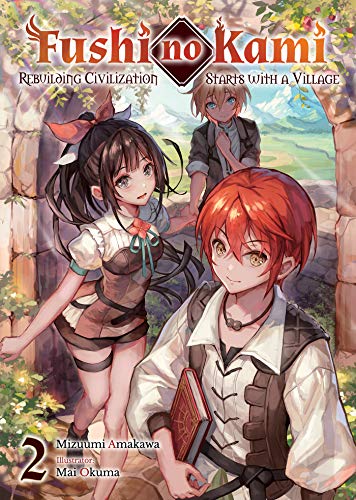By Mizuumi Amakawa and Mai Okuma. Released in Japan as “Fushi no Kami: Henkyou kara Hajimeru Bunmei Saiseiki” by Overlap. Released in North America by J-Novel Club. Translated by Maurice Alesch.
Last time I asked for Ash to have a few failures under his belt, and we do get a bit of that here, showing that he can’t do ANYTHING he puts his mind to. Food preservation is still a big problem, and the wonders of canned food will have to wait for more advanced techniques. There’s more good news: by now, everyone has gotten so used to Ash being the greatest thing since sliced bread that they’ve started to stop talking about it, which means less page count devoted to everyone praising him to the skies. That said, there’s a larger failure towards the back half of the book, as he chooses to try to save a village on its last legs, mostly due to sentimentality, and finds that while rebuilding civilization may start with a village, the village is not necessarily of one mind, and that humans tend to be lazy, cowardly and devious creatures. Fortunately, the next generation shows more promise.
On the cover are Renge, the maid who took a significant role in Book 3, and gets a much larger one here, and Suiren, her friend from a neighboring village. They had a falling out a couple years ago about the fate of Suiren’s village – the poor harvests have hit it particularly badly, but they’re too stubborn to give up or move. Now it’s a couple of years later, and things are even worse. Still, Renge is diligent, steadfast, and kindhearted, and wants to help them even though she’s been rebuffed. And Suiren is feeling regretful, and also the pangs of starvation, so is willing to accept the help. Everything is in place for Ash to test his new fertilizer experiments, and things seem to go swimmingly – until Suiren’s father, the actual village chief (who had been “ill” before) reappears to screw everything up.
For the most part, Ash is in “bad cop” mode throughout a lot of this book, and it’s not hard to see why. While he is resolved to help Suiren’s village because of Renge’s pleas, the village has not done a great job of even the minimal farming requirements. Even after he teaches them the right methods, some are better at them than others – and the ones who do poorly get less food. And when they’re proud of themselves for achieving results using the fertilizer… he points out everything they did wrong. It’s a brutal teaching method, and one that Maika and the others who’ve been around him just shrug off. Some, like Suiren, grow to be better, stronger people under these circumstances… and some, like her father, end up arrested and having their village taken away. Lesson learned: do what Ash says. Of course, this lesson does not apply to Ash himself, who tells the soldiers not to go to far trying to take down some treant monsters and then promptly goes too far. He is “do as I say, not as I do” in triplicate.
We’ve caught up with Japan, as the 5th volume of the book is not due out there till the end of July. So we leave Ash and Maika for a time. (He’s still not recognizing anyone is in love with him, and we can definitely add Renge to that list – though fortunately NOT Suiren.) Till then, let’s enjoy the fact that by now everyone has grown so used to Ash’s maniacal ideas that they take them in stride. Mostly.


